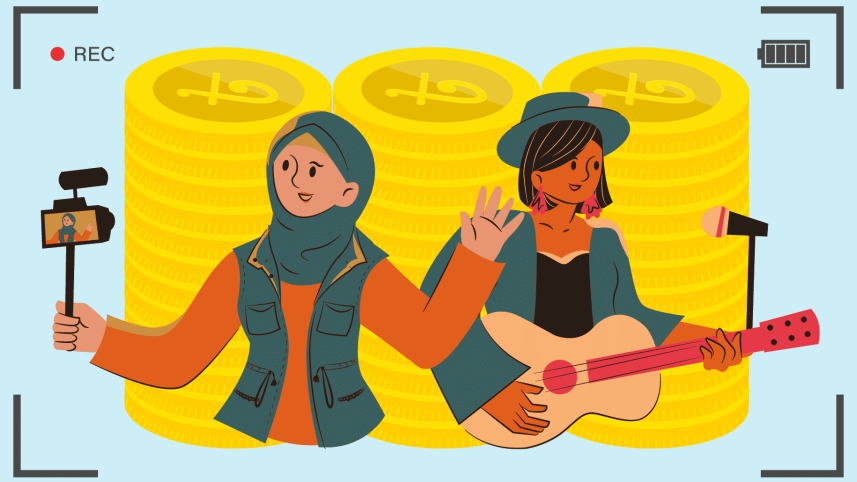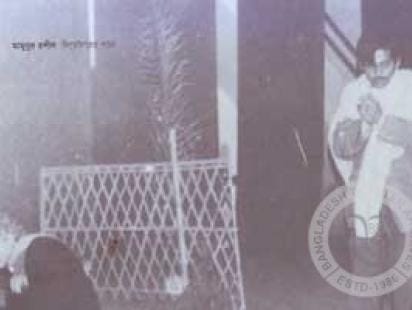The aftermath of turning hobbies to hustle

Last year, I opened an Instagram business art page after I'd been told by many friends and family that my art was good enough to be sold and admired. However, after every upload, the dread of seeing declining numbers became a stormy sensation anytime I viewed the little activity bar on my profile.
Despite the fact that I have sold some paintings, my page is now a ghost town packed with expired ambition and stale delight. Continuing with your art, be it music or illustration, after successfully monetising it, seems to be a turning point for a lot of people.
Since my scale of success is relatively small, I have reached out to people who have turned their beloved hobbies into successful commercial ventures to truly understand how this journey pans out.
Noushin Nuri is a business student and content creator, making funny and informative videos for her 41k followers online. Noushin began filming herself speaking on a variety of social issues with no aim of commercialising the videos. However, once her videos started gaining popularity, her ship of creating monetised content had set sail. The growing popularity brought with it an unforeseen new element that changed her outlook on her work.
When asked about how the tangible scale of success had impacted her, Noushin shared, "The number has affected me more than it should have. I have always been used to having a small group of friends. So, suddenly having thousands of people watching me online made me overwhelmed. I started double-guessing before posting every video just because of the sheer number of people. The follower-count really had a bad impact on my content creation."
As for creating videos, Noushin added, "I decided to take a break because of the pressure. The break still didn't come to an end."
This turning point right in the middle of a success story does not seem to be an isolated incident. Afrida Mehzabin, an artist, filmmaker, and illustrator, encapsulated this same issue, and said, "When my first-ever animated film won the first prize at an international platform, at that moment I kind of felt like my work was a success. It did, however, put a lot of pressure on me. After my second film, I got into this huge artist's block for one whole year. But now I'm slowly trying to work it out."
An artist's block, or any form of creativity block, is something one faces in their lives at some point in time. But this form of block can most likely be attributed to a disillusioned sense of expectation, be it from within ourselves or the expectations others might set on us. Any level of success brings a spotlight on your work, putting it under the scrutiny of all of your viewers.

With so many eyes on your work, it's natural to overthink and second guess yourself before presenting something new to the public. It is easy to fall prey to the anxiety of having to recreate success at every turn. The need to present consistently good work combined with the constant pressure to one up yourself creates a cycle of inflated expectations that truly robs us of the joy our hobbies initially gave us.
The inspiration that started our hobbies, whether for our own gratification or for a greater cause, becomes buried in the tangled complexity of exaggerated expectations and judgement. Juggling our own motivations for working and others' outlooks of our work becomes a challenge, leading the two to become juxtaposed.
Afrida articulated, "I feel like people expect more of me now and I'll never be able to meet their expectations. I try to keep the pressure off by reminding myself that I do art for myself, not to meet people's expectations."
Furthermore, as an artist, putting aside what we want to work on in order to meet the demands of commissioned work might cause us to lose sight of what it was that drew us to our interests in the first place.
Whether turning any and every interest of ours into a hustle is the right thing for us, is an entirely different conversation. Ultimately, whether we choose to monetise our hobbies or not, the aftermath of that decision is something we have to deal with. Like most things in life, this is a double-edged sword. The affirmation of a measurable level of accomplishment, as well as the benefits of commercialisation, may help us solidify our relationship with our interests. Additionally, it may even give us new perspectives that we otherwise would not have attained.
"Content creation helped me understand our society a lot better since my content centred on social topics. I also mastered some skills like script writing, video editing, and thumbnail editing. I learned some stuff about the algorithm, too. None of these would have happened without content creation," shared Noushin.
Nevertheless, we have to cut ourselves some slack when we eventually get overwhelmed. Afrida imparted some advice she wishes she could give her younger self, "I'd probably say that never be hard on yourself and just go for what your heart wants. Also, ask for money in advance."
An artist's block is not something to be feared, just how commercialising a hobby is not something to dread. Prioritising our mental well-being while not losing sight of our original motivations, coupled with juggling the ups and downs of our creative pursuits are some of the prime factors in gaining success without compromising our true selves.
It may be difficult, but achieving this balance can allow us to continue doing what we love without jeopardising ourselves in the long run.
Nushba is uselessly raging about the patriarchy and crying because her cat doesn't love her. Please send help at nushba.tajreen@gmail.com
 For all latest news, follow The Daily Star's Google News channel.
For all latest news, follow The Daily Star's Google News channel.
Comments